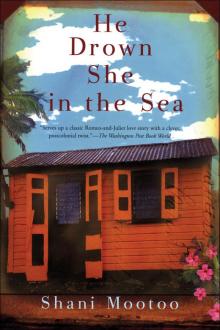- Home
- Shani Mootoo
He Drown She in the Sea
He Drown She in the Sea Read online
Praise for He Drown She in the Sea:
“A poignant, sophisticated and troubling portrait of how class, race and ethnicity determine mobility and fortune on an island much like her native Trinidad, and how the insecurities of social standing are communicated, reinforced and deeply internalized in the individual and collective psyches … Mootoo works the fine balance between despondency and hope to tremendous effect, infusing the story with yearning, melancholy and bittersweet promise fuelled by the suspense of whether liberation and redemption from class and past is ultimately achievable.”
—Camilla Gibb, National Post (Ontario)
“The story is rich in the patois and daily rhythms of the Caribbean. … One of Mootoo’s real accomplishments is her portrayal of the expatriate Harry. … Much of the novel is recounted in snippets and flashbacks, from many points of view, which gives the tale a fine-grained, beautifully textured finish.”
—Publishers Weekly
“A sensual novel filled with tangy descriptions of tastes and smells and sounds.”
—Paul Gessell, The Gazette (Montreal)
“Eight years after a stunning debut, a terrified novelist emerges with proof she’s no ‘one-book wonder.’”
—Ottawa Citizen
“The incremental dawning of class consciousness and the accompanying shame that ensues are brilliantly evoked. … Its tricky, persuasive, and sensual emotional terrain makes it more real than anything confined to the two dimensions of a map.”
—Quill & Quire
“Mootoo has burst through the emotional boundaries of her previous novel, Cereus Blooms at Night. With this new work she takes a more encompassing swipe at life, and the result is astounding.”
—Thomas Trofimuk, Edmonton Journal
Praise for Cereus Blooms at Night:
“Mootoo has an impeccable ear. … The plea for tolerance that lies at the heart of this novel is both authentic and powerful.”
—The New York Times Book Review
“A story of magical power.”
—Alice Munro
“The fecund and fertile cycles of Caribbean life pervade this powerful first novel from Mootoo who invokes all the senses … to portray the town of Paradise.”
—Publishers Weekly (starred review)
“The sinuous unwinding of Mootoo’s clever plot will remind many reader’s of Arundhati Roy’s The God of Small Things, which this novel resembles also in its plentitude of exotic detail, magical-realist interludes, and captivating language.”
—Kirkus Reviews (starred review)
“Strong, sad and sensual … Cereus Blooms at Night is wrought as deftly as a piece of lacework. … A confident and lively first novel.”
—Los Angeles Times
“Fans of magical realism will revel in the superb narrative power of Shani Mootoo’s debut novel. … Mootoo is a masterful storyteller who has woven a fascinating narrative propelled by vividly drawn characters who are both achingly human and passionately bizarre.”
—The Washington Post
He Drown She in the Sea
Also by Shani Mootoo
Cereus Blooms at Night
Out on Main Street
The Predicament of Or
He Drown
She in the
Sea
SHANI MOOTOO
Copyright © 2005 by Shani Mootoo
All rights reserved. No part of this book may be reproduced in any form or by any electronic or mechanical means, including information storage and retrieval systems, or the facilitation thereof, without permission in writing from the publisher, except by a reviewer, who may quote brief passages in a review. Any members of educational institutions wishing to photocopy part or all of the work for classroom use, or publishers who would like to obtain permission to include the work in an anthology, should send their inquiries to Grove/Atlantic, Inc., 841 Broadway, New York, NY 10003.
Printed in the United States of America
FIRST GROVE PRESS PAPERBACK EDITION
Library of Congress Cataloging-in-Publication Data
Mootoo, Shani.
He drown she in the sea / Shanti Mootoo.
p. cm.
eBook ISBN-13: 978-1-5558-4702-9
1. West Indians—Canada—Fiction. 2. World War, 1939–1945—Caribbean Area—Fiction. 3. Caribbean Area—Fiction. 4. Friendship—Fiction. 5. Immigrants—Fiction. 6. Islands—Fiction. I. Title.
PR9199.3.M6353H4 2005
813′.54—dc22
2004065653
Grove Press
an imprint of Grove/Atlantic, Inc.
841 Broadway
New York, NY 10003
Distributed by Publishers Group West
www.groveatlantic.com
For Dhanwatee and Deoraj Samaroo,
and Essie Boodoosingh—
everywhere you are
He Drown She in the Sea
THE DREAM
Almost a decade after he left Guanagaspar, a dream he used to have recurs. Though he lives by the sea now, the sea in this dream is invariably the other one, that of his earliest childhood. In the dream he first notices that there are no frigate birds in the sky and that the sea has suddenly and strangely retreated. Then, there are no waves but the ocean undulates, and the level of the water on the horizon rises rapidly. On the exposed floor of the ocean gasping fish slap themselves until, exhausted, they give up and are still. The sea begins to swell, swelling until its surface is smooth and shiny, like a taut plastic bag on the verge of bursting. And he realizes that the reason there are no frigates in the sky is that from there they already saw the magnitude of the ocean’s bulge, and, predicting the outcome of its inevitable and imminent belch, they took off to seek refuge.
For several minutes he watches to make sure he is not mistaken. The ocean is heaving now, sighing with its unusual weight, inhaling and exhaling painfully. There are many people on the beach. People whom he previously saw through the windows when the taxi he rode in on mornings with his mother passed through villages on the way to the city. Although all the people have noticed the swelling and are pointing at the sea, they settle themselves on the beach as if to stay and watch. He is the only one concerned. He begins to analyze and strategize. He can see that if the sea continues to grow like that, it is bound to split its plastic-like surface, emptying it of its intestines and all that it has swallowed.
He runs up and down the beach screaming to people. They see only a little boy, too young to know anything, too young to pay him attention. When they ignore him, he begins forcibly pushing them off the beach, trying to sound like a reasonable adult, a big man begging them to get back inside and board up their houses, to shut their windows and doors and stuff blankets, newspapers, anything in the cracks. But he is too small, too young, for them to take seriously. One or two groups of people do get up and leave, but not because of his warnings; they have just had enough of a day at the beach. He rushes over to stray dogs and shoos them up the beach. He lurches at corbeaux that are too engrossed in the carcasses of dead fish and other animals to notice what the frigates saw from higher up.
He thinks of his mother and that if no one else will listen, he must save at least his mother and himself. He races up to his own house and explains to her what he has seen. He tells her that in order to protect themselves they must quickly and carefully prepare their house. His mother listens. She believes him. She goes outside and fetches all the chickens, brings them inside, and they begin to prepare … he shuts and locks the front door, and she and he diligently seal every space between the door and the rough jamb, finally shoving a table up hard against it. Anywhere light from outside enters their house they shove a piece of paper, a piece of cloth, or nail boards over it.
They mostly keep silent, uttering only quick orders. Their ears are trained on the ocean, listening to it as it continues to groan and creak under the strain of its swelling. When they are sure that the house is sealed tight, that no water, light, or air can enter, they sit down next to each other and await its thunderous cracking apart.
Then the quiet descends. The birds and the dogs are silent. Everything is still. Neither coconut, mango, nor lime trees rustle. The breeze that is a constant seems suddenly to have gasped in awe of what is progressing, as if holding its breath in terror. There are no sounds of the other people. The boy and his mother realize they will lose many people they know.
In the dream he knows that everyone else will be swept away by the sea, but it is more a feeling of regret that this will happen than one of panic.
And then the creaking of the ocean begins. As it gets louder, the dogs go mad, and they yelp in helplessness. The corbeaux begin to squeal and shriek and fight each other for space in the topmost branches of the trees. The wind starts up again, and in no time whips around the houses and trees and through the bushes. Then the humans cry out as they at last see what is about to happen, and he holds his breath and wraps his arms around his mother’s waist. She clutches the chickens. He draws her to stand against the farthest wall of the tiny house, fairly certain, but not entirely, that they will be spared. There they wait. Anytime now. But no crash is audible above the din of the wind and the shrieking. The sole indication that the ocean has indeed burst open is the sound of water creeping swiftly up the beach, up over the sea grape vines, into the crocus patch, drowning all the orange flowers, and then up, way up the clay yard. They hear the thirsty clay ground suck at the first taste of water, but suddenly there is so much water rising that the ground chokes and spits and then succumbs in silence. They feel water rising under the house, lapping at the boards. And he knows that he has done the right thing by stuffing the cracks, because the secret to not being swept away is that no water, not the tiniest drop, must enter the house, otherwise it can pry open the boards like a crowbar and rip the house apart. There is one final surge, coming at them so high now that it crashes at half height of the house. But the house is like a rock in the ocean. The sea rises around it and then passes by. The water rolls on up the land a bit, and then they hear its retreat, and when the ground around them crackles dry again, they know it is safe to look out. He opens the door to find that the house is entirely intact, in its place, not budged an inch. It has been washed clean by the salty water. However, all around, the shattered remains of houses are strewn, and in the ocean, now settled back in its place, are floating bodies and wood chips the size of matchsticks: the remains of boats, houses, and furniture. He and his mother make their way to the water’s edge and see the bodies of people they know. Uncle Mako in his red merino and blue swimming trunks floats by, and the boy and his mother sigh and shrug and say to each other, “If only, if only.”
I
HOW MADAM’S MOUTH RUNNETH OVER
The Caribbean island of Guanagaspar. Present day.
It was not yet the end of the rainy season, and the air in the house bristled with all manner of trouble. Even though Piyari had already cleaned everything that same day, Madam took up the dust cloth and wiped counters, pictures, ornaments, and furniture as she spoke. Perspiration glistened on Madam’s forehead and upper lip. Rivulets of it escaped from under her uncoiffed hair, slipped down her graying temples, and pooled about her neck, causing the plain gold-plate chain she wore to shimmer.
“Who would have thought, Piyari, that so late in life a person could get another chance? Look: I have two adult children, and with no warning whatsoever, in what should be the downward slope of life, a light light up, brighter than the sun, to point me in a whole new direction.”
Madam crumpled the dust cloth into a ball, took a quick and deep breath, and pressed the dirty rag to her face. Piyari, startled, leaped forward and as quickly withdrew, realizing at once that it wasn’t really possible for Madam to suffocate herself in this manner. She grimaced. How could Madam talk of happiness in one breath, she wondered, and in the next bury her face in that dirty rag full of dust and that white powdery mold that covered everything in the muggy months? But she was becoming used to the unusual behavior. Madam dragged the cloth across her face and, in so doing, erased the thick application of reddish-brown color from her lips. A dark wetness blossomed about the armpits of the yellow silk blouse Piyari had ironed for her just that morning.
“Let me say once and for all: from the day I left my mother’s house and got married, nobody has bothered to ask me what I think or what I feel. Nobody in this country can imagine that I might have feelings. Not all those people who like to take pictures of Boss and me and put them in their papers, not even Boss, and certainly not the children. I pass my whole life in the service of those two children, and now look: I wouldn’t see Jeevan unless I hand out formal invitation to him and his wife. And Cassie? You could understand why my only daughter had to go so far away, on the other side of Canada, to live? Well, if I didn’t know better before, better and me have at long last become acquaintances. Everything change, Piyari. I am not stepping backward—I cannot go back to the way it used to be. Is time for a fresh start, in truth.”
Piyari had learned to spot a story coming. She slid one of the caned high-back chairs away from the dining table and plopped herself down. An hour or two could pass like this: Piyari sitting, turning her whole body sometimes, sometimes just her head, to face Madam as Madam hustled, cleaned, and talked. And the more Madam provoked her future with stories of the summer past, the harder, the faster she swept, dusted, and polished furniture, cleaned cupboards, threw out old and long-unused household items. Madam’s confidences bestowed much importance upon Piyari, but she knew well that such a privilege had the potential to one day prove burdensome. Still, this revolt brewing in her employer’s house, right before her very eyes, she relished. And besides, the house, Piyari noticed, had never—at least not before that summer of which Madam babbled—been so spotless.
Madam put down the cloth and picked up a ceramic vase rendered in the shape of a fish that had leaped out of the sea high into the air and was captured by the artist just as it hit the water on its arched back. She lifted her head to the ceiling, closed her eyes, and ran a finger along the pale, curved belly line of the fish, and a fingernail into the deep blue iridescent grooves of its well-wrought tail fin. The high-pitched squeal of fingernail against glazed ceramic broke her reverie. She squeezed the unyielding fish with both her hands, then shook the vase. There was a sluggish, guttural swish of old water. It had been almost a month since there were fresh flowers in the house. The water was at least that old, and surely bitter with the odor of rotted chrysanthemum remains. Madam put her nose to the gaping mouth of the fish and sniffed. Piyari straightened herself, ready to answer to the accusation, ready to get back to her business of housecleaning, of doing chores like washing out that vase. But Madam did not even wrinkle her nose. Instead, with sudden swiftness, as if she had smelled a revelation in the belly of the fish, she gathered up and twisted her shoulder-length hair into a bun. With pins fetched erratically from the pocket of her skirt, she secured the bun, whipped the cloth off the table again, and began wiping, wiping, wiping every ornament in sight. Piyari made a mental note to wash out the fish vase.
Madam executed a sharp about-face and marched into the kitchen. Piyari jumped up and followed. Madam opened the door of the freezer compartment and stared for a long time at its contents. Piyari knew if she stayed still long enough, Madam would begin to reveal more about that holiday on the west coast of Canada and that the refrigerator/freezer would be as clean as the day it was bought, without her having to lift a finger. When Madam started pulling out frozen packages of meat and plastic containers of leftovers and piling them up on the kitchen table, Piyari leaned up against the counter and relaxed.
“What we keeping leftovers for? Throw them out. Look at this fridge. Throw ev
erything out. Don’t keep a damn thing. I have to say it yet again? Is time for a fresh start.”
When the freezer was emptied, Madam looked around. Piyari anticipated her need and quickly fetched a bowl of soapy water and a sponge. Madam dipped the sponge in the water.
“Christmas round the corner, Piyari, but summer—like it was only yesterday—that summer just past was the candle burning bright on my future. And today, today-self, the future is unfolding.” She turned back to the freezer.
“But let not one-man-Jack have cause to say I spoil their Christmas. I, exemplary wife, will make no waves before then. We will put up the tree—tell the yard boy to climb on top the cupboard in the storeroom and to bring down the white plastic tree, not the green one, but the one that nice and white and look like it have snow on the branches, and we will put out some ornaments. We will set the table for Christmas, usual as usual: turkey, ham, pastels, sorrel. But, mark my word, come New Year’s, it will be a different story, because I am finished with ‘exemplary.’”
Piyari perked up and, for the sake of the possibility, as slim as it was, of taking a little holiday time off, risked interrupting the flow of Madam’s thoughts.
“You planning something for New Year’s, Madam? Is best if I know all now so, so I will know what days off you giving me. But all what so will be happening, Madam?”
“All what so is happening? All now so, you see me standing here in front of this fridge, things happening. You asking? I not fraid to say, you know—not ’fraid, that is, to say to you, but what I have to say is not any and everybody business and is not to travel, eh. You hearing me good?”
Madam looked in Piyari’s direction, but Piyari knew that she did not really see her. Madam inhaled and breathed out long and hard, then slowly shook her head as if regretfully resigned to the weight of what she was about to say. “Now, you must know, and you must know good, that until I was sitting right there in Cassie’s living room in her apartment in Vancouver, with the telephone on the side table next to me, until the moment that I did it, I had had no plan to see the Eggman again. You know who I talking about? Ent you remember the Eggman?”

 Cereus Blooms at Night
Cereus Blooms at Night Polar Vortex
Polar Vortex He Drown She in the Sea
He Drown She in the Sea Valmiki's Daughter
Valmiki's Daughter Moving Forward Sideways Like a Crab
Moving Forward Sideways Like a Crab